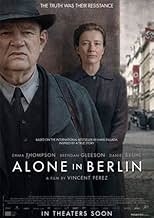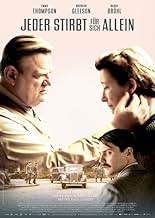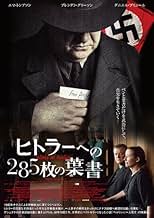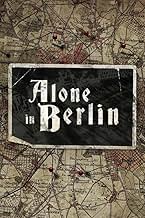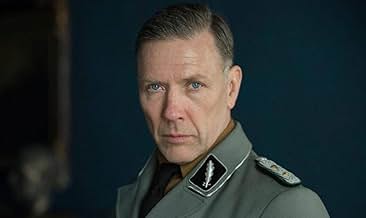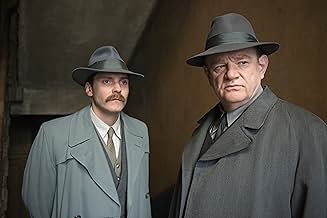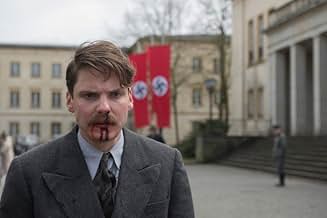VALUTAZIONE IMDb
6,5/10
10.292
LA TUA VALUTAZIONE
Dopo che una coppia della classe operaia tedesca nazista ha perso il figlio nella seconda guerra mondiale, decidono di vendicarsi lasciando segretamente carte scritte a mano a Berlino che de... Leggi tuttoDopo che una coppia della classe operaia tedesca nazista ha perso il figlio nella seconda guerra mondiale, decidono di vendicarsi lasciando segretamente carte scritte a mano a Berlino che denunciano il loro governo.Dopo che una coppia della classe operaia tedesca nazista ha perso il figlio nella seconda guerra mondiale, decidono di vendicarsi lasciando segretamente carte scritte a mano a Berlino che denunciano il loro governo.
- Regia
- Sceneggiatura
- Star
- Premi
- 3 candidature totali
Joachim Bißmeier
- Fromm
- (as Joachim Bissmeier)
Recensioni in evidenza
There is really very little you can criticize about a story when the story is true. The adaptation for the screen can come under scrutiny, but in this case there really is no cause for concern. It is a beautifully shot and crafted piece of cinema. Excellent Cast, and solid direction.
You are introduced to a view of history from a less common angle. The lives and story of people who opposed the rise of Nazi Germany from within. People who stood up to the fear, collusion, and general despair of the masses. Most too scared to fight back, choosing instead to lay low and hope for the best.
You can draw frightening parallels with the world today. Except we have social media to voice our anger and concerns at what we see as injustice. The tyrants and demigods around the world fight to block free speech on the internet just as Hitler and the SS did in Germany in the late 1930's and 40's. If you disagree with them you are wrong and risk being silenced and oppressed.
This film depicts the pre-internet world's attempt at quiet resistance. Slower, less reach, but still shows the importance of non conformity in the face of oppression. A valuable watch for all who love true stories, and perhaps particularly relevant at the moment.
You are introduced to a view of history from a less common angle. The lives and story of people who opposed the rise of Nazi Germany from within. People who stood up to the fear, collusion, and general despair of the masses. Most too scared to fight back, choosing instead to lay low and hope for the best.
You can draw frightening parallels with the world today. Except we have social media to voice our anger and concerns at what we see as injustice. The tyrants and demigods around the world fight to block free speech on the internet just as Hitler and the SS did in Germany in the late 1930's and 40's. If you disagree with them you are wrong and risk being silenced and oppressed.
This film depicts the pre-internet world's attempt at quiet resistance. Slower, less reach, but still shows the importance of non conformity in the face of oppression. A valuable watch for all who love true stories, and perhaps particularly relevant at the moment.
War films are stories writ large about aggression between nations. Few of them explore small-scale human undercurrents of suppressed dissent inside the countries at war. Alone in Berlin (2016) does this by looking at an ordinary working-class couple and their compulsion to express feelings about Hitler's dictatorship at time where dissent meant certain death. It is also an essay on parental grief struggling to voice its pain of loss.
Based on real events, the story opens in a small flat in Berlin where Otto Quangel (Brendan Gleeson) and his wife Anna (Emma Thompson) learn that their son has died in battle. In a long marriage that is under strain, the news pushes them further apart as they cannot console each other in grief. Otto had encouraged his son to join the Nazi army and now Anna blames him for their loss. Desperate to voice his rage against Hitler's regime, he painstakingly writes postcards and secretly leaves them on stairwells and doorways where they can be seen by passers-by: he calls them "small grains of sand in Hitler's machine". Initially he keeps Anna away from his dangerous mission, but she insists on being involved and they both become clandestine resistance fighters whose weapons are simple messages about the evils of Nazism. They manage to write and distribute over 260 cards despite extensive investigative efforts to stop them. In the process, they resurrect their marital relationship. After almost two years of card-writing they are caught and together face Nazi justice.
This film has two parallel narratives that start in opposition and end in convergence: one is Otto and Anna's actions, the other is the investigation. The first is focused on the smallness of the couple's actions in contrast to the enormous risk they are taking, like a pair of mice squeaking at roaring lions. The filming, colour palette and period setting are drab and lifeless; the atmosphere is paranoid with suspicion and mistrust; and the acting is subdued and understated. Brendan Gleeson and Emma Thompson are actors with broad performance repertoires but here they are minimalist in expression and Spartan in dialogue, with much being conveyed through furtive glances or avoided eye-contact. It is a slow-moving story, observant of small details in an alienated world. This has the effect of amplifying the intensity of Otto and Anna's actions. Close-ups of a pen leaving a trail of outrage on a small white card become powerful portraits of bravery that are ultimately futile as most of the cards were handed in to authorities. The couple's nemesis is a young German investigator (Daniel Bruhl) who pursues his work with ideological fervour for the Fuhrer but whose success turns into the film's most devastating moments of despair.
This is a joyless story about humble heroism. Otto and Anna are emblematic of ordinary people dealing with tragedy and anger inside a world of fear and danger. Far from being mere victims, their small protests seriously unsettled the Nazi hierarchy and the closing scenes are a tribute to the power of their "small grains of sand".
Based on real events, the story opens in a small flat in Berlin where Otto Quangel (Brendan Gleeson) and his wife Anna (Emma Thompson) learn that their son has died in battle. In a long marriage that is under strain, the news pushes them further apart as they cannot console each other in grief. Otto had encouraged his son to join the Nazi army and now Anna blames him for their loss. Desperate to voice his rage against Hitler's regime, he painstakingly writes postcards and secretly leaves them on stairwells and doorways where they can be seen by passers-by: he calls them "small grains of sand in Hitler's machine". Initially he keeps Anna away from his dangerous mission, but she insists on being involved and they both become clandestine resistance fighters whose weapons are simple messages about the evils of Nazism. They manage to write and distribute over 260 cards despite extensive investigative efforts to stop them. In the process, they resurrect their marital relationship. After almost two years of card-writing they are caught and together face Nazi justice.
This film has two parallel narratives that start in opposition and end in convergence: one is Otto and Anna's actions, the other is the investigation. The first is focused on the smallness of the couple's actions in contrast to the enormous risk they are taking, like a pair of mice squeaking at roaring lions. The filming, colour palette and period setting are drab and lifeless; the atmosphere is paranoid with suspicion and mistrust; and the acting is subdued and understated. Brendan Gleeson and Emma Thompson are actors with broad performance repertoires but here they are minimalist in expression and Spartan in dialogue, with much being conveyed through furtive glances or avoided eye-contact. It is a slow-moving story, observant of small details in an alienated world. This has the effect of amplifying the intensity of Otto and Anna's actions. Close-ups of a pen leaving a trail of outrage on a small white card become powerful portraits of bravery that are ultimately futile as most of the cards were handed in to authorities. The couple's nemesis is a young German investigator (Daniel Bruhl) who pursues his work with ideological fervour for the Fuhrer but whose success turns into the film's most devastating moments of despair.
This is a joyless story about humble heroism. Otto and Anna are emblematic of ordinary people dealing with tragedy and anger inside a world of fear and danger. Far from being mere victims, their small protests seriously unsettled the Nazi hierarchy and the closing scenes are a tribute to the power of their "small grains of sand".
"Alone in Berlin" (German-French-British co-production; 2016 release; 105 min.) brings the story of a German couple, Otto and Anna. As the movie opens, we see a young German soldier running through the weeods, and he is shot and killed. The young man's parents, Otto and Anna, are informed by letter of his death, and they don't know how to cope with this tragic news. Eventually Otto decides to speak up against the Nazis, and Hitler in particular, by leaving provocative postcards (such as: "Hitler is a liar, Hitler is a killer") in prominent public places. Anna joins him in these potentially dangerous tasks. Eventually, the Nazis become aware of this, and a manhunt is started... At this point we're 15 min. into the movie, but to tell you more of the plot would spoil your viewing experience, you'll just have to see for yourself how it all plays out.
Couple of comments: this is the latest movie from Swiss actor/writer/producer/director Vincent Perez. Here he takes what amounts to a footnote in the annals of WWII and makes it, or at least tries to make it, into an epic battle between an elderly couple and the Nazi establishment. At certain moments, in particularly later in the film, it works quite well. But there are too many times that the films truly feels staged, I mean you can practically hear the director yell "and.... ACTION!", and an entire street with 1940s cars comes alive. The lead performances by Emma Thompson (as Anna) and Brendan Gleeson (as Otto) are fine, as they bring a quiet dignity to this couple that is so outraged by the tragic death of their son. Incidentally, it isn't until the closing credits that we get confirmation this movie is based on true events, and Otto and Elise really did exist (why they changed the woman's name to Anna, is not clear to me). Still, when all is said and done, it feels to me like the movie didn't quite carry this to its full potential, and that's a shame.
I had heard of this movie, but never had a chance to see it in the theater. I did catch it recently on Showtime. If you are interested in WWII, even if only a footnote of it, I'd suggest you check this out, be it on TV or VOD, or on DVD/Blu-ray, and draw your own conclusion.
Couple of comments: this is the latest movie from Swiss actor/writer/producer/director Vincent Perez. Here he takes what amounts to a footnote in the annals of WWII and makes it, or at least tries to make it, into an epic battle between an elderly couple and the Nazi establishment. At certain moments, in particularly later in the film, it works quite well. But there are too many times that the films truly feels staged, I mean you can practically hear the director yell "and.... ACTION!", and an entire street with 1940s cars comes alive. The lead performances by Emma Thompson (as Anna) and Brendan Gleeson (as Otto) are fine, as they bring a quiet dignity to this couple that is so outraged by the tragic death of their son. Incidentally, it isn't until the closing credits that we get confirmation this movie is based on true events, and Otto and Elise really did exist (why they changed the woman's name to Anna, is not clear to me). Still, when all is said and done, it feels to me like the movie didn't quite carry this to its full potential, and that's a shame.
I had heard of this movie, but never had a chance to see it in the theater. I did catch it recently on Showtime. If you are interested in WWII, even if only a footnote of it, I'd suggest you check this out, be it on TV or VOD, or on DVD/Blu-ray, and draw your own conclusion.
Once again, World War II turns up another true story of quiet valour to turn into a motion picture. At a time when Trump is pontificating about so called "fake news", here is a timely tale from history which centres on the battle against genuinely fake news: the Nazi propaganda machine.
After losing their only son in the French campaign, Berliners Otto (Brendan Gleeson,"Harry Potter and the Goblet of Fire") and Anna (Emma Thompson, "Saving Mr Banks") turn against the regime and in repeated acts of rebellion Otto laboriously hand writes subversive postcards to leave in office blocks around Berlin.
Out to catch him is local police investigator Escherich (Daniel Brühl) but in an age before CCTV that's no easy task and with increasing SS pressure the stakes for Escherich steadily increase. For Otto and Anna, the stress is there but both are resigned to their fate: with their son stolen from them for an unjust cause they are an island of indifference in an unholy land. Both are 'alone in Berlin?
After 70 years it still chills the blood to see German locations decked out in Nazi regalia, but one of the joys of this film is this rendering of life in wartime Berlin: starting with jubilation at German progress prior to D-Day and turning to despair and genuine danger as the tide turns towards 1945. In a pretty bleak film there are touches of black comedy now and then: Otto's carpentry company is being encouraged "by the Fuhrer" to double and triple their output of coffins.
More joy comes from the star turns of Gleeson and Thompson, both of who deliver on their emotionally challenging roles. Gleeson in particular makes a very believable German with a sour demeanour and a steely determination. But the star acting turn for me goes to the wonderful Daniel Brühl ("Rush") as the tormented police detective, bullied into an ethical corner by the SS. The finale of the film – whilst not seeming quite believable – makes for a nicely unexpected twist.
Based on a novel by Hans Fallada, the lead writing credits for the piece are shared between Achim von Borries and the director Vincent Perez – in a rare directorial outing for the Swiss actor. The script exudes a melancholic gloom and at times expresses beautifully both the grief and love shared by this older couple. But some of the dialogue needs more work and we don't see enough of Thompson in the early part of the film where her motivations should be being developed. This rather comes down to a lack of focus by the director. While the primary story of the card distribution is slight, it is compelling and a detour into a sub-story about an old Jewish lodger living upstairs is unnecessary and detracts from the overall story arc. I would have far preferred if the running time had been a tight 90 minutes just focused on Otto's mission. One final comment on the script: did I mishear that Anna claimed to have a 6 year old child during an air raid scene? I know Emma Thompson looks great for her age, but .
I can't finish this without commending the beautiful piano score of Alexandre Desplat. From the first note I knew it was him – he has such a characteristic style – and his clever use of the score complements the film exquisitely. "Small" films like this tend to rather disappear into the woodwork for Oscar consideration, but here's a soundtrack that I think should be considered: (but what do I know when "Nocturnal Animals" wasn't even nominated in one of the Oscar crimes of the century!).
In summary, I found this a thoughtful and thought-provoking film, that – despite some of the mean reviews I've seen – I thought was well crafted and with excellent production design by Jean-Vincent Puzos ("Amour"). It will be particularly appreciated by older audiences looking for an untold story from the war, and by all lovers of fine acting performances by the three leads.
(For the full graphical review please visit http://bob-the-movie-man.com. Thanks!).
After losing their only son in the French campaign, Berliners Otto (Brendan Gleeson,"Harry Potter and the Goblet of Fire") and Anna (Emma Thompson, "Saving Mr Banks") turn against the regime and in repeated acts of rebellion Otto laboriously hand writes subversive postcards to leave in office blocks around Berlin.
Out to catch him is local police investigator Escherich (Daniel Brühl) but in an age before CCTV that's no easy task and with increasing SS pressure the stakes for Escherich steadily increase. For Otto and Anna, the stress is there but both are resigned to their fate: with their son stolen from them for an unjust cause they are an island of indifference in an unholy land. Both are 'alone in Berlin?
After 70 years it still chills the blood to see German locations decked out in Nazi regalia, but one of the joys of this film is this rendering of life in wartime Berlin: starting with jubilation at German progress prior to D-Day and turning to despair and genuine danger as the tide turns towards 1945. In a pretty bleak film there are touches of black comedy now and then: Otto's carpentry company is being encouraged "by the Fuhrer" to double and triple their output of coffins.
More joy comes from the star turns of Gleeson and Thompson, both of who deliver on their emotionally challenging roles. Gleeson in particular makes a very believable German with a sour demeanour and a steely determination. But the star acting turn for me goes to the wonderful Daniel Brühl ("Rush") as the tormented police detective, bullied into an ethical corner by the SS. The finale of the film – whilst not seeming quite believable – makes for a nicely unexpected twist.
Based on a novel by Hans Fallada, the lead writing credits for the piece are shared between Achim von Borries and the director Vincent Perez – in a rare directorial outing for the Swiss actor. The script exudes a melancholic gloom and at times expresses beautifully both the grief and love shared by this older couple. But some of the dialogue needs more work and we don't see enough of Thompson in the early part of the film where her motivations should be being developed. This rather comes down to a lack of focus by the director. While the primary story of the card distribution is slight, it is compelling and a detour into a sub-story about an old Jewish lodger living upstairs is unnecessary and detracts from the overall story arc. I would have far preferred if the running time had been a tight 90 minutes just focused on Otto's mission. One final comment on the script: did I mishear that Anna claimed to have a 6 year old child during an air raid scene? I know Emma Thompson looks great for her age, but .
I can't finish this without commending the beautiful piano score of Alexandre Desplat. From the first note I knew it was him – he has such a characteristic style – and his clever use of the score complements the film exquisitely. "Small" films like this tend to rather disappear into the woodwork for Oscar consideration, but here's a soundtrack that I think should be considered: (but what do I know when "Nocturnal Animals" wasn't even nominated in one of the Oscar crimes of the century!).
In summary, I found this a thoughtful and thought-provoking film, that – despite some of the mean reviews I've seen – I thought was well crafted and with excellent production design by Jean-Vincent Puzos ("Amour"). It will be particularly appreciated by older audiences looking for an untold story from the war, and by all lovers of fine acting performances by the three leads.
(For the full graphical review please visit http://bob-the-movie-man.com. Thanks!).
This is not a happy story. It is story that opens your eyes. We have talked about it a lot since. We felt like it was something that should be seen. I would recommend it for folks curious about that era and that place in time. It seems impossible now, but you know its not. Real life stories like this tell something more for me than the big picture story.
Lo sapevi?
- QuizBased on the novel "Jeder stirbt für sich allein" (Every Man Dies Alone) by Hans Fallada. The novel was allegedly based on Gestapo files to which Fallada was given access.
- BlooperEmma Thompson wears her wedding ring on her left hand. Germans, both men and women, wear them on their right hands. The German actor who plays Judge Fromm correctly wears his wedding ring on this right hand.
- Citazioni
Otto Quangel: What more can a man donate than his child?
- ConnessioniVersion of Jeder stirbt für sich allein (1962)
I più visti
Accedi per valutare e creare un elenco di titoli salvati per ottenere consigli personalizzati
- How long is Alone in Berlin?Powered by Alexa
Dettagli
- Data di uscita
- Paesi di origine
- Sito ufficiale
- Lingua
- Celebre anche come
- Alone in Berlin
- Luoghi delle riprese
- Aziende produttrici
- Vedi altri crediti dell’azienda su IMDbPro
Botteghino
- Lordo Stati Uniti e Canada
- 33.125 USD
- Fine settimana di apertura Stati Uniti e Canada
- 8869 USD
- 15 gen 2017
- Lordo in tutto il mondo
- 1.205.598 USD
- Tempo di esecuzione1 ora 43 minuti
- Colore
- Proporzioni
- 2.35 : 1
Contribuisci a questa pagina
Suggerisci una modifica o aggiungi i contenuti mancanti

Divario superiore
By what name was Lettere da Berlino (2016) officially released in India in English?
Rispondi

